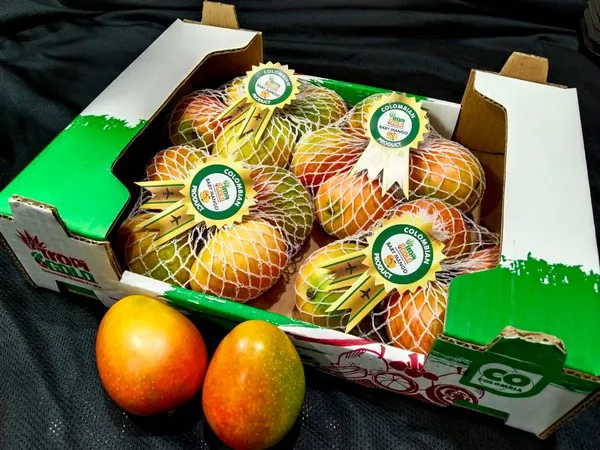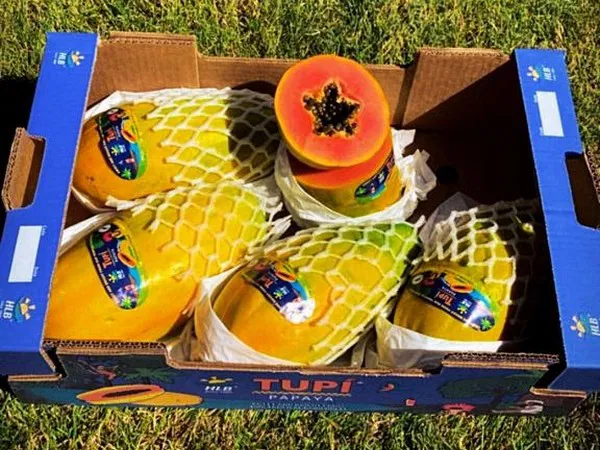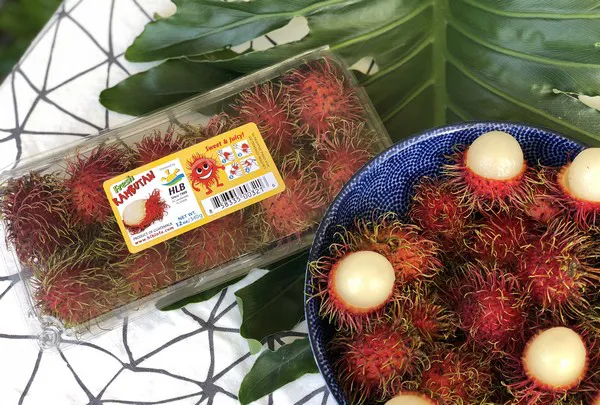Well known for its papaya product offering and later on also exotic fruits, Florida-based HLB Specialties witnessed tremendous growth in the past decade. “Exotic fruits are very much in demand and it is great to see the positive impact they make on health,” says Lorenz Hartmann de Barros with HLB Specialties.
In 2019, he left Florida and moved back to Germany to share his US experience through HLB’s European company HLB Tropical Food in Kelsterbach, Germany. “Initially, my family and I had planned to stay for a few months,” Hartmann de Barros said. “That turned into a year, then three years and now almost four years.” In these past four years, the German team has doubled in size, and the warehouse also expanded. The pandemic played a significant role in the growth of the business as consumers were looking to add healthy foods with lots of vitamins to their diets.
 Sugar mangos.
Sugar mangos.
Year-round availability
“Retail has always been our specialty and it is our goal to introduce exciting items to the retail segment. In the past four years, we’ve introduced several new items in Germany that are all available year-round,” Hartmann de Barros commented. From Colombia, the company brings in mangosteen, yellow pitahaya, granadilla, physalis (goldenberry), sugar baby mangoes (snack mango), maracuya, and small passion fruit (gulupa). Yellow pitahaya is also imported from Ecuador and rambutan comes in from Guatemala. HLB’s flagship product papaya is imported from Brazil, along with pink pitahaya and red guava. Apart from South America, some items are also sourced in Asia. “We switch growing areas based on availability and quality to ensure year-round supply on almost all items.”

Labels bring identity
To get retailers excited to add new exotic items to their shelves, the HLB team enjoys visiting retailers and have them try the products themselves. “Ultimately, it is the shopper who determines the success of a new item and it’s important to bridge the gap between consumers and the shelf,” Hartman de Barros commented. “Basically, every shopper wishes to have a personal assistant who knows them well and recommends which items to eat.”
Although that’s not realistic, consumers are naturally curious, willing to try things out. “The best reward is to see someone excited when they try something new, knowing they receive a return on flavor and health.” To bridge the gap between the shelf and the consumer and to earn their trust, the HLB team uses specially designed labels for their packaging. These labels try to bring identity to a product and incorporate feelings like appreciation and recognition. “Labels that provide information on how the fruit looks inside, how to cut it, etc. allow us to build trust with consumers.”
 Rambutan with label.
Rambutan with label.
Air freight
While HLB’s exotic items were initially only available in Germany, Austria and the UK, the company has expanded distribution across Europe. Other countries of supply include Spain, Lithuania, the Netherlands, Italy, Sweden, Greece, and France. “There’s good demand for high-quality exotics in Europe, and we focus on bringing in premium product.”
Everything comes in by air and lands in Frankfurt. From there, it takes 10 minutes to reach the company’s warehouse where different varieties can be mixed and packed, depending on the retailer’s needs. “We enjoy being a one-stop for exotics and offer our clients the convenience of knowing that their one “metaphorical” basket is really made up of several individual baskets. Instead of having to deal with multiple suppliers, our clients come to us, knowing that we procure all items from many different sources. This enables continuity with less supply gaps.”
 For more information:
For more information:
Lorenz Hartmann de Barros
HLB Tropical Food GmbH
Tel: (+49) 6107 987810
Europe@hlbtropical.com
www.hlbinfo.com
